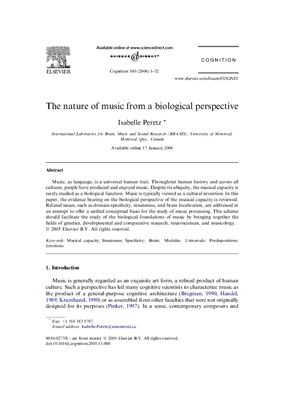Inteational Laboratory for Brain, Music and Sound Research
(BRAMS), University of Montreal, Montreal, Que., // Cognition,
Canada, 2006
Abstract
Music, as language, is a universal human trait. Throughout human history and across all
cultures, people have produced and enjoyed music. Despite its ubiquity, the musical capacity is rarely studied as a biological function. Music is typically viewed as a cultural invention. In this paper, the evidence bearing on the biological perspective of the musical capacity is reviewed. Related issues, such as domain-specificity, innateness, and brain localization, are addressed in an attempt to offer a unified conceptual basis for the study of music processing. This scheme should facilitate the study of the biological foundations of music by bringing together the fields of genetics, developmental and comparative research, neurosciences, and musicology.
Keywords: Musical capacity; Innateness; Specificity; Brain; Modules; Universals; Predispositions; Emotions
Abstract
Music, as language, is a universal human trait. Throughout human history and across all
cultures, people have produced and enjoyed music. Despite its ubiquity, the musical capacity is rarely studied as a biological function. Music is typically viewed as a cultural invention. In this paper, the evidence bearing on the biological perspective of the musical capacity is reviewed. Related issues, such as domain-specificity, innateness, and brain localization, are addressed in an attempt to offer a unified conceptual basis for the study of music processing. This scheme should facilitate the study of the biological foundations of music by bringing together the fields of genetics, developmental and comparative research, neurosciences, and musicology.
Keywords: Musical capacity; Innateness; Specificity; Brain; Modules; Universals; Predispositions; Emotions

